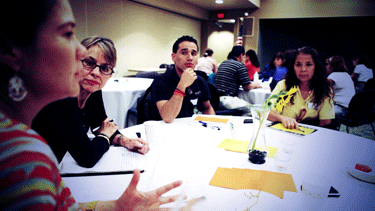Leaders from Latino, organizational communities share dialogue through 'Bridges in Action' program

Leaders from community organizations and the Latino community
shared ideas during the recent "Bridges in Action" program.
September 11, 2013
The idea seems doable: Bring Latino community leaders and community/organizational leaders from throughout the Midlands together to discuss barriers to care for Latino families and then begin the dialogue on addressing these challenges.
Yet, busy people have busy schedules. Interpreters must be available. Many Latino community leaders have jobs and obligations that also can affect scheduling. And hospital directors, health department managers and educators, too, are working on multiple issues.
However, PASOs (meaning "steps" in Spanish) at the Arnold School of Public Health has long been committed to making possible those things that seem difficult or even impossible in an effort to improve the lives of Latino families. And this summer, PASOs moved forward to bring leaders from both the Latino and organizational communities together.
The result was "Bridges in Action."
PASOs began in 2005 to serve pregnant Latina women living in Richland and Lexington counties. Since then, PASOs has expanded its work to meet the needs of parents, children and growing families. The Puentes (Bridges) project was part of that growth. In this program, Latino community leaders, also called ambassadors, are trained in vital maternal and child health information, leadership and communication skills, English language skills, adult teaching methods, and navigation of resources and health services.
Each ambassador facilitates neighborhood meetings and shares crucial maternal and child health information in a culturally acceptable format that they have designed. As ambassadors reached out to community members and documented their concrete experiences, the need for the "Bridges in Action" event became evident.
"South Carolina has the second fastest growing Latino population in the United States," said Julie Smithwick, executive director of PASOs. "The need for dialogue and interaction between the Latino community and the service providers and leaders in the counties in which they live continues to grow."
Meeting at Palmetto Health Baptist, 16 community ambassadors, 10 interpreters and event facilitators, and 28 organizational leaders from 21 organizations from throughout Richland and Lexington counties gathered to discuss how best to serve the needs of the Latino community by overcoming language and cultural barriers and improving access to health care, education, pediatric and maternal services.
Dr. Deborah Billings of the Arnold School's Department of Health Promotion, Education, and Behavior, said the event used the "World Café" technique, in which program participants gather at tables to discuss topics and exchange ideas. Conversation results are placed on paper and shared at the end of the discussion, and participants move to other tables to interact with another group of people.
"Participants discussed three main questions that have emerged over the past three years of the Puentes Project: First, if there were a bridge between the organizations and the Latino community, what would it look like?" said Billings, one of the event's facilitators. "Second, what are the characteristics of high quality services for the Latino community? Third, how do Latino community leaders bring value to organizations?"
All of these are serious questions requiring serious, but open discussion.
"PASOs has been working with our Columbia-area and statewide partner organizations for several years now, and they have always expressed a desire to hear directly from Latino community leaders about ways to increase access to care and provide high quality services to this community," said Julie Smithwick, executive director of the PASOs program.
"This event was to bring together leaders from these organizations and Latino leaders that have been through intensive capacity-building processes by PASOs to talk about issues and begin forming solutions together," she said.
During the event, Latino community leaders and organizational leaders talked about barriers to care for Latino families and then began discussing ways that these challenges can be addressed, Billings said.
"Now PASOs will continue to further this dialogue and will bring people back together to implement changes and share best practices through different forums," she said.
One of those forums will be at 5:30 p.m. Sept. 26 at the Richland County Library on Assembly Street, Columbia. The Community Forum, being held in collaboration with the Consortium for Latino Immigration Studies and USC's Institute for Partnerships to Eliminate Health Disparities, is scheduled as part of Hispanic Heritage Month.
Creative solutions are being developed to change the way health services are delivered and ultimately to improve health outcomes, Smithwick said.
"The involvement and active participation of the Latino community are key to any success," she said.
Visit http://www.scpasos.org to know more about the outcomes from the conversations of "Bridges in Action."
Follow the events and activities of PASOs and the Puentes Project on Facebook: http://www.facebook.com/pasosprogram.



_01.jpg)
_02.jpg)